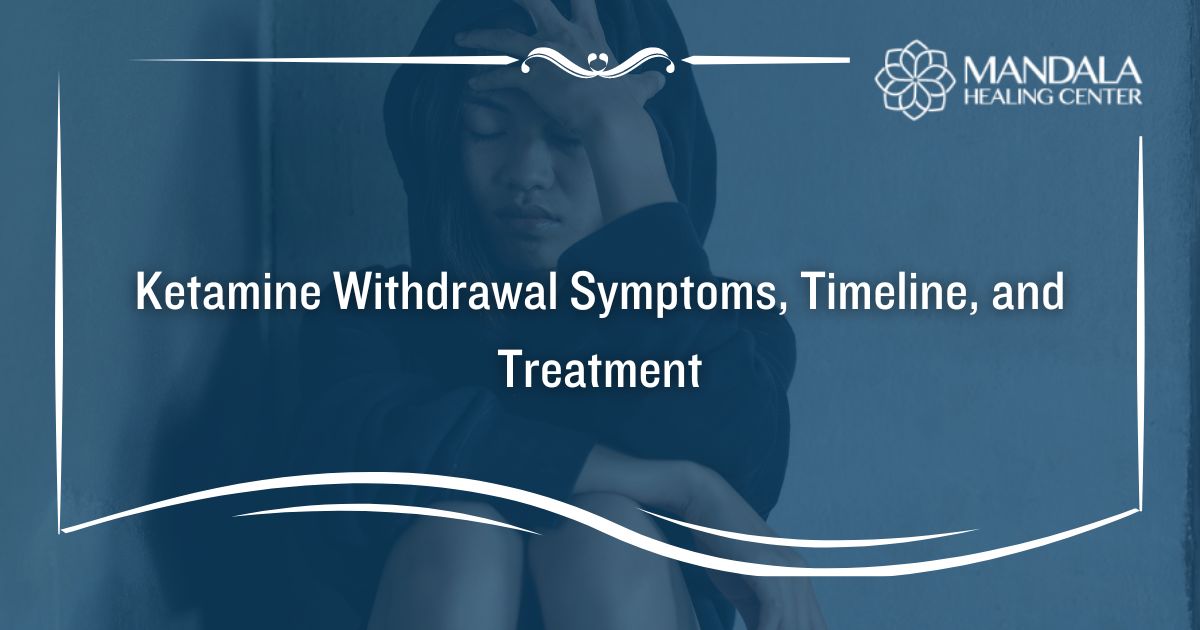Ketamine is a dissociative drug primarily used by veterinarians as an anesthetic for large animals. However, in recent years smaller doses of the substance have been used to treat depression, suicidal ideation, substance use disorders, and post-traumatic stress disorder (PTSD).[1]
While ketamine can be effective in managing the symptoms of a wide range of mental health conditions, abusing the drug recreationally can lead to addiction.
Ketamine can cause hallucinogenic and euphoric effects, so anyone misusing the substance should be cautious. Once you become addicted to ketamine, you will experience symptoms of withdrawal upon stopping the use of it.
If you or a loved one abuses ketamine, being aware of the withdrawal symptoms, timeline, and treatment can motivate you to seek the help you need.
What are the Symptoms of Ketamine Withdrawal?
When you become addicted to ketamine, your brain and body grow accustomed to the presence of the substance, and your body begins to rely on ketamine to function properly. If you suddenly stop taking ketamine, you will experience symptoms of withdrawal.
The symptoms of ketamine withdrawal include:[2]
- Confusion
- Anxiety and depression
- Hallucinations
- Difficulty breathing
- Motor function impairment
- Excessive shaking
- Suicidal thoughts
- Nausea and vomiting
- Insomnia
- Bouts of anger or agitation
- Fatigue
- Irregular heartbeat
Ketamine withdrawal can be severe, so you must have access to medical treatment. Detoxing at home could put you at risk of experiencing severe symptoms, attempting to use ketamine to soothe your symptoms, and suffering from an overdose because your tolerance has gone down from a few days of abstinence.
The Ketamine Withdrawal Timeline
The symptoms of ketamine withdrawal can last anywhere from 72 hours to several weeks. Exactly how long your symptoms last will depend on a variety of factors, including the dose you abused, how long you were taking ketamine, and whether you were taking other substances at the same time.
While the ketamine withdrawal time varies from person to person, most people have similar experiences.
1 to 3 Days
The initial symptoms of withdrawal typically begin within 24 hours of your last dose of ketamine. While these symptoms are mild, they are extremely unpleasant. You may experience tremors, tiredness, an inability to sleep, and nausea within the first few days of ketamine withdrawal.
4 Days to 1 Week
Around the fourth day of withdrawal, your symptoms will begin to peak. This means your withdrawal symptoms will be at their most severe. You might experience hallucinations, temporary loss of hearing, agitation, confusion, and even difficulty breathing.
2 Weeks or More
After about two weeks, your symptoms should begin to subside. It is possible for psychological symptoms like anxiety, depression, and insomnia to persist for a few weeks after your physical withdrawal symptoms taper off. As a result, it is important to be under the direct supervision of a medical detox center.
How is Ketamine Withdrawal Treated?
In most cases, detox programs treat ketamine withdrawal using the tapering method. They will slowly decrease your dose of ketamine until your body no longer needs the substance. Tapering prevents severe symptoms of withdrawal.
Some individuals who have developed health conditions like urinary issues as a result of their ketamine addiction might be taken off of the substance immediately. In these cases, symptom-specific medications will be administered to directly manage the symptoms of withdrawal you experience.
In addition, your overall health will be monitored on a 24/7 basis to ensure that you are safe and healthy throughout the detox process.
After you have been medically stabilized, you will begin treatment planning with the mental health and substance use disorder specialists at the center. Your treatment plan may include:
- Inpatient treatment
- Outpatient rehab
- Sober living programs
- 12-Step meetings
- Aftercare support services like alumni groups
- Continued case management or legal assistance
Find Help for Ketamine Addiction
If you or a loved one are addicted to ketamine, it’s time to seek help. Ketamine addiction can lead to a variety of health issues, including life-threatening overdoses. As a result, it is vital that you seek support from a professional detox program.
At Mandala Healing Center, offer you a full continuum of care. From medical detox to inpatient treatment, we have everything you need to achieve and maintain long-term sobriety from ketamine.
Clients are taken on a journey of healing through complete immersion into evidence-based clinical modalities, multifaceted alternative therapies, and expert medical management, allowing them to fully detox and recover from drug and alcohol addictions.
To learn more about our ketamine detox and treatment programs, contact Mandala Healing Center today.
References:
- The National Library of Medicine (NLM): The Therapeutic Effects of Ketamine in Mental Health Disorders: A Narrative Review, Retrieved July 2023 From https://www.ncbi.nlm.nih.gov/pmc/articles/PMC9053551/
- The American Journal of Psychiatry (AJP): A Potential Case of Acute Ketamine Withdrawal: Clinical Implications for the Treatment of Refractory Depression, Retrieved July 2023 From https://ajp.psychiatryonline.org/doi/10.1176/appi.ajp.2020.20101480












